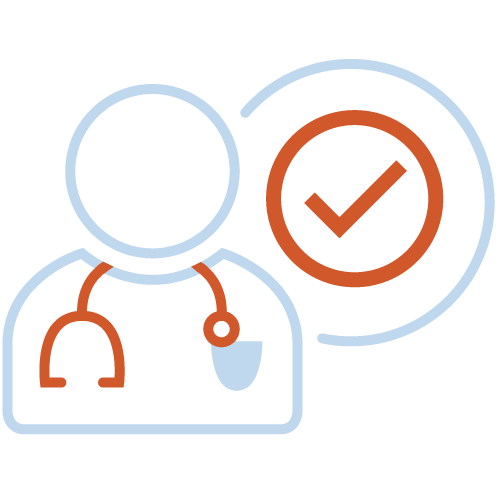Refer patients to trusted care
Abortion is safe, legal, and accessible in Massachusetts
If you do not provide abortion care, you can offer individualized referrals to trusted providers.

You can search for abortion care using this map, which also alerts you to anti-abortion center locations with a "Fake Abortion Clinic" label. (This map is maintained by Reproductive Equity Now Foundation, a trusted partner of the Massachusetts Department of Public Health.)
If your patient is seeking other comprehensive sexual and reproductive healthcare services, search for trusted sexual and reproductive health service locations. These health care providers offer birth control and emergency contraception (EC) prescriptions, comprehensive pregnancy options counseling and referrals, infertility services, STD/STI testing and treatment, and more.
Learn how anti-abortion centers harm pregnant people
Deceptive advertising:
Anti-abortion centers may advertise themselves as reproductive health care facilities, but do not offer comprehensive care.
They may advertise abortion-related care, but don't provide abortions, counseling on the full range of pregnancy options, or referrals to providers who do. Many put ads on Google so that they appear in search results for abortion or pregnancy-related searches. Some anti-abortion centers operate near comprehensive reproductive health care clinics. Some even mimic their names and logos to try to look like they are connected.
Misleading practices:
Beware of "free" products or services.
Some anti-abortion centers provide free resources like pregnancy tests or ultrasounds to get patients in the door. However, they will often mislead patients about how far along their pregnancy is. They may offer other free products but may make patients participate in classes or programs to access the items.
Delayed health care:
Anti-abortion centers may try to delay patients' care and prevent them from accessing abortion care.
They may delay scheduling patients' appointments so that they miss the timeframe when they can obtain an abortion. When patients call to ask about abortion care, they may require them to come in for an appointment before giving any information, which delays their care.
Medical disinformation:
They often provide misinformation about abortion to prevent patients from making an informed choice about their care.
This may include false information about access to abortion, promotion of “abortion pill reversal”, and exaggerated information about the risks of abortion. In fact, abortion is very safe. Abortion is one of the safest medical procedures; it has a lower complication rate than many other common medical procedures.
Untrained staff and volunteers:
Many anti-abortion centers have staff or volunteers who are not trained or licensed medical professionals.
Some may even wear white coats or other attire to look like medical professionals. Staff and volunteers who are not licensed medical professionals may not be required to follow codes of ethics and standards or to keep patients' records private.
Some staff or volunteers at anti-abortion centers may interpret (read results) of ultrasounds without the required training or medical background to do this. This can lead to inaccurate results about a patient's pregnancy, including how far along their pregnancy is.
Intentional targeting:
Many anti-abortion centers purposefully operate and advertise themselves in lower income communities and communities of color, where there may be fewer options for comprehensive reproductive health care.
Review scope of practice and licensure obligations
The Department of Public Health (DPH) is committed to comprehensive reproductive health care access. DPH’s goal is to strengthen the integrity of the health care system in the state and foster an environment of trust and compassion for those who are navigating the many options available to them at a challenging and time-sensitive point in their lives.
Very few anti-abortion centers in Massachusetts are licensed clinics. Typically, they are staffed by nonmedical individuals or volunteers, and do not provide medical services. DPH does not have oversight over facilities that do not provide medical care.
However, DPH has oversight over anti-abortion centers that are licensed clinics. DPH requires entities holding themselves out as clinics to be licensed and subject to DPH oversight (see M.G.L. Chapter 111, Section 52 for the definition of “clinic”). DPH has provided guidance to ensure that professional licensees and facility licensees are adhering to their designated scope of practice and operating transparently and free from misleading practices.
View guidance for Massachusetts licensed physicians, physician assistants, nurses, pharmacists, pharmacies, hospitals, and clinics: Reminder to Licensees Regarding Licensure Obligations and Providing Standard of Care PDF | Doc
Support patients that need to file a complaint

If your patient was harmed by an anti-abortion center or had a concerning experience, support them in filing a complaint online with the Attorney General's Civil Rights Division or by calling (617) 963-2917.
Patients can also file complaints about staff who may have violated standards of professional conduct:
- Submit a complaint against a physician
- File a complaint about a nurse
- File a complaint with the Bureau of Health Professions Licensure (physician assistants and other health care professionals)
Download shareable materials
Share information about anti-abortion centers with your patients. Download materials on the Anti-Abortion Center Awareness Campaign Social Media Toolkit.
Learn more about abortion care protections in Massachusetts
Abortion protections in Massachusetts
Learn more about protections for abortion and reproductive health services in MA.
How the Department of Public Health is responding
Learn what the Department of Public Health (DPH) is doing to protect comprehensive reproductive health care access and respond to complaints regarding several anti-abortion centers.
Consumer Advisory from the Office of the Attorney General
View the Consumer Advisory about anti-abortion centers ("crisis pregnancy centers") issued by the Office of the Attorney General.


